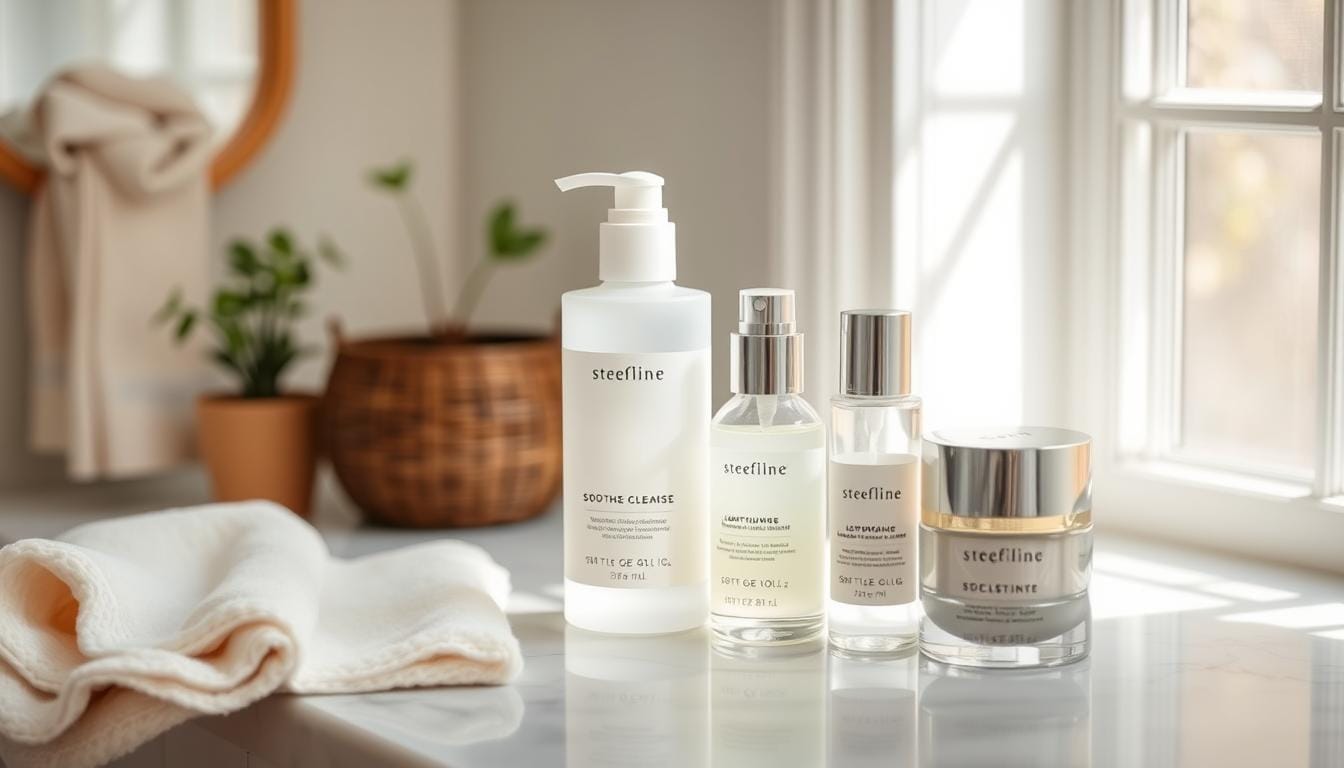Looking after sensitive skin can be tricky. But with the right products and a gentle routine, you can keep your skin healthy and glowing. This will avoid irritation and keep your skin looking its best.
This guide will show you how to create the best morning and night routines for sensitive skin. You’ll discover how to spot what irritates your skin and pick soothing ingredients. You’ll also learn how to build a skincare plan that cares for and protects your skin.
This article is for you if you’re dealing with redness, dryness, or sensitivity. It will give you the tools and knowledge to improve sensitive skin care. Say hello to a gentle skincare routine that makes your skin calm, comfortable, and radiant all day.
Understanding Sensitive Skin and Its Challenges
Sensitive skin is a common issue. It reacts strongly to many things and products. If you have it, your skin might get red, itchy, or inflamed easily. Knowing what your skin needs is key to a good skincare routine.
Common Symptoms of Sensitive Skin
Sensitive skin shows itself in different ways. Symptoms can differ from person to person. Some common sensitive skin symptoms are:
- Redness and flushing
- Itching or burning sensations
- Dryness and flakiness
- Tightness or discomfort
- Bumps or rashes
If you often see these signs, you might have sensitive skin. Watching how your skin reacts to products and the environment helps manage it.
Identifying Triggers and Irritants
Knowing what irritates your skin is important for sensitive skin care. You can avoid or lessen exposure to these irritants by finding out what makes your skin react. Common irritants include:
| Trigger Category | Examples |
|---|---|
| Environmental factors | Extreme temperatures, wind, sun exposure, pollution |
| Skincare ingredients | Fragrances, alcohol, harsh exfoliants, sulfates |
| Lifestyle factors | Stress, lack of sleep, poor diet, smoking |
You can choose better products and environments by identifying triggers for your skin. This helps you create a skincare routine that reduces irritation and keeps your skin healthy.
The Importance of a Gentle Skincare Routine
For sensitive skin, a gentle skincare routine is key. Harsh products can harm your skin, making it more sensitive and uncomfortable. A gentle approach helps soothe and protect your skin.
Using gentle products keeps your skin balanced. Sensitive skin tends to get dry, red and inflamed. Gentle products nourish your skin without irritating it.
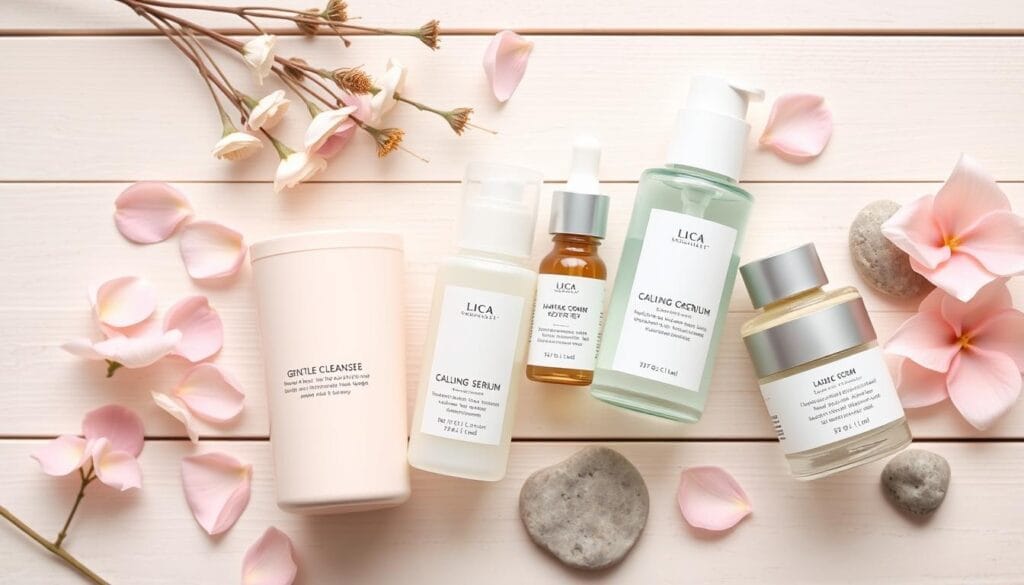
- Fragrance-free
- Hypoallergenic
- Non-comedogenic
- Free from harsh chemicals and irritants
These features reduce the risk of irritation. Start new products slowly and watch for any sensitivity.
Consistency is important for sensitive skin. A regular routine helps your skin adapt and get stronger. Here’s a comparison of basic and advanced gentle skincare routines:
| Basic Gentle Skincare Routine | Advanced Gentle Skincare Routine |
|---|---|
| Gentle cleanser | Double cleansing (oil-based cleanser followed by a gentle water-based cleanser) |
| Alcohol-free toner | Essence or serum targeted for sensitive skin concerns |
| Lightweight, fragrance-free moisturizer | Lightweight, fragrance-free moisturizer + facial oil or balm for extra nourishment |
| Broad-spectrum sunscreen (SPF 30 or higher) | Broad-spectrum sunscreen (SPF 30 or higher) + vitamin C serum for antioxidant protection |
Keep your skincare simple, gentle, and tailored to your skin’s needs. By being gentle and listening to your skin, you can reduce sensitivity and keep your skin healthy.
Essential Steps in a Sensitive Skin Care Routine
A gentle skincare routine is key for sensitive skin. Follow these steps to soothe and protect your skin.
Cleansing
For sensitive skin cleansing, choose a mild, fragrance-free cleanser. It should not remove your skin’s natural oils. Look for products made for sensitive skin and avoid harsh ingredients like sulfates and alcohol.
Toning
A sensitive skin toner balances your skin’s pH and adds hydration. Pick an alcohol-free, non-irritating toner. It should have soothing ingredients like aloe vera, chamomile, or green tea extract.
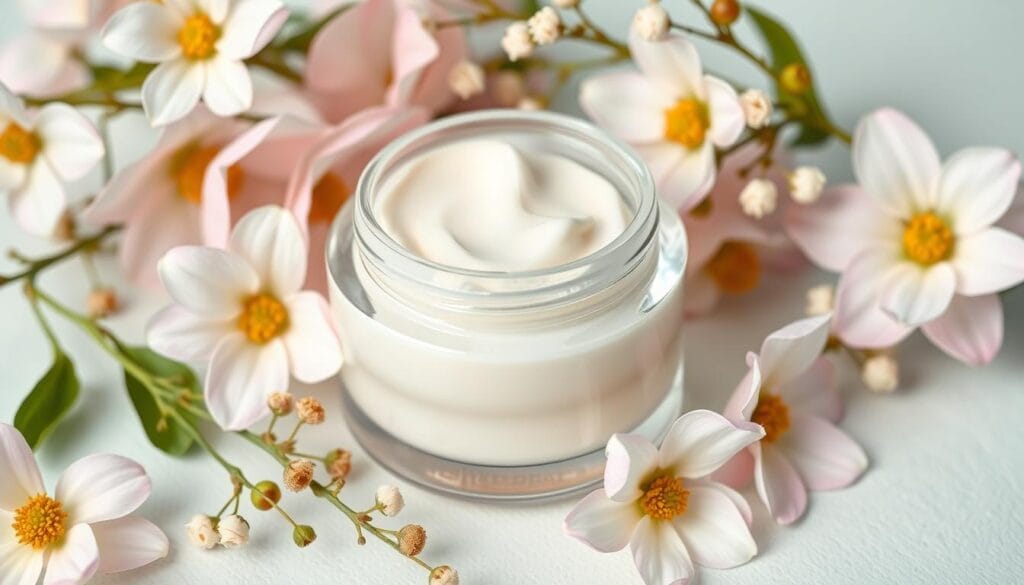
Moisturizing
Hydration is vital for sensitive skin. Choose a sensitive skin moisturizer that is lightweight and fragrance-free. It should have nourishing ingredients like ceramides, hyaluronic acid, and glycerin.
Sun Protection
Sun protection for sensitive skin is critical to prevent irritation and damage. Use a gentle, mineral-based sunscreen with at least SPF 30. Look for formulas with zinc oxide or titanium dioxide, which are less likely to cause reactions.
When creating your sensitive skincare routine, consider these product recommendations:
| Step | Product Recommendation |
|---|---|
| Cleansing | Cetaphil Gentle Skin Cleanser |
| Toning | Kiehl’s Ultra Facial Toner |
| Moisturizing | La Roche-Posay Toleriane Double Repair Face Moisturizer |
| Sun Protection | EltaMD UV Clear Broad-Spectrum SPF 46 |
Morning Skincare Routine for Sensitive Skin
Starting your day with a gentle morning skincare routine is key for healthy, calm, and radiant skin. By following simple steps and using the right products, you can soothe your skin. This protects it from irritation and environmental stressors.

Gentle Cleansing Tips
For morning cleansing, choose gentle cleansers without harsh sulfates, fragrances, or dyes. Opt for creamy, non-foaming formulas that hydrate and soothe. Use lukewarm water and avoid rubbing or scrubbing, as this can irritate your skin.
Instead, gently massage the cleanser into your skin with your fingertips. Rinse thoroughly.
Lightweight Moisturizers
After cleansing, apply a lightweight moisturizer made for sensitive skin. Look for products with calming and hydrating ingredients like aloe vera, chamomile, and hyaluronic acid. These ingredients soothe and hydrate without feeling heavy or greasy.
Gently pat the moisturizer onto your skin until fully absorbed.
SPF for Sensitive Skin
No morning skincare routine is complete without sun protection. Choose a sensitive skin sunscreen with an SPF of at least 30. It should protect against UVA and UVB rays.
Opt for mineral-based sunscreens with zinc oxide or titanium dioxide. These are less likely to irritate sensitive skin. Apply a generous amount to your face, neck, and any exposed areas. Reapply every 2 hours or as needed throughout the day.
Night Skincare Routine for Sensitive Skin
When the day ends, your sensitive skin needs extra care. A good night skincare routine can soothe irritation and repair damage. It helps your skin get back to its natural state while you sleep.
By using gentle yet effective products, you can wake up with healthier, more radiant skin.
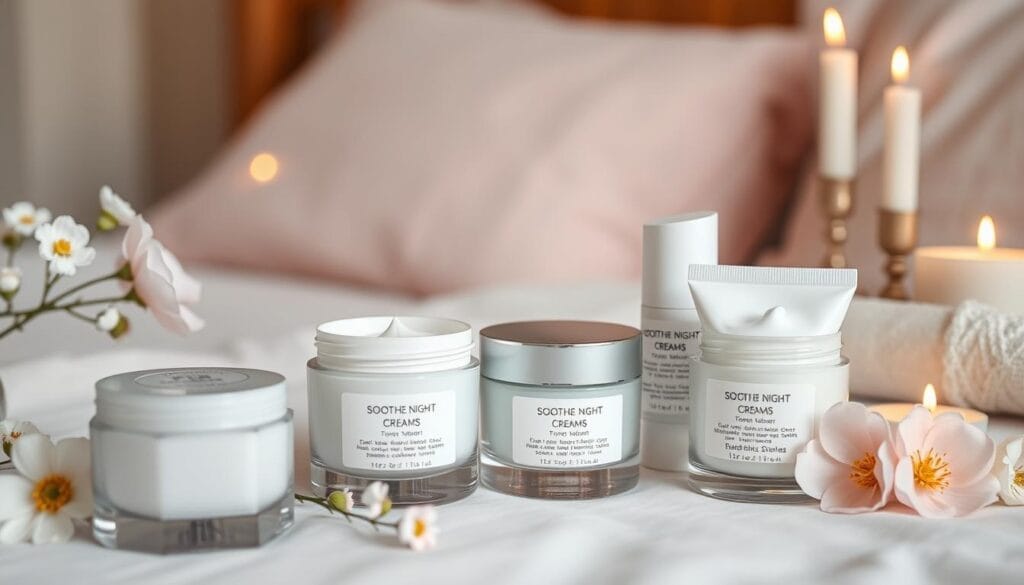
Double Cleansing for Thorough Makeup Removal
Double cleansing is a must for sensitive skin. Begin with a gentle oil-based cleanser to remove makeup and sunscreen. Then, use a mild water-based cleanser to get rid of any leftover dirt.
This two-step method cleanses well without drying out or irritating your skin.
Soothing and Nourishing Night Creams
After cleansing, apply a soothing night cream to your skin. Look for creams with aloe vera, chamomile, and green tea extract. These ingredients calm inflammation, hydrate, and strengthen your skin’s barrier.
Apply the cream with gentle strokes, letting it fully absorb before sleep.
For sensitive skin, keep your night skincare simple and gentle. Double cleansing and using soothing night creams are key. They give your skin the TLC it needs for a great morning look and feel.
Ingredients to Look for in Sensitive Skin Products
When you’re looking for skincare for sensitive skin, focus on calming ingredients. These ingredients help soothe, hydrate, and protect your skin. They can reduce irritation, redness, and discomfort, making your skin feel calm and nourished.
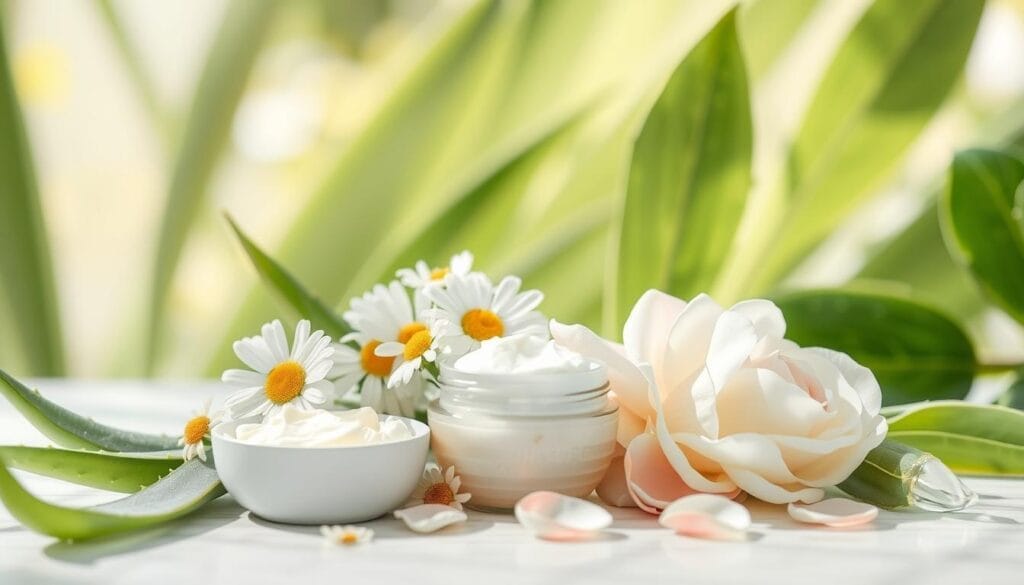
Aloe vera is a well-known ingredient for sensitive skin. It’s known for its soothing and anti-inflammatory properties. This makes it a great choice for those with easily irritated skin. Aloe vera cools and calms the skin, reducing redness and providing hydration.
Chamomile is another calming ingredient to consider. This gentle flower extract has been used for centuries to soothe sensitive skin. It has anti-inflammatory and antioxidant properties, helping to reduce irritation and protect the skin from environmental stressors.
Oats are also great for sensitive skin. Colloidal oatmeal, a finely ground form of oats, has been clinically shown to soothe and relieve dry, itchy, and irritated skin. It helps lock in moisture, strengthen the skin’s natural barrier, and reduce inflammation, making it an ideal choice for those with sensitive skin.
Other calming ingredients to look for in your sensitive skin products include:
- Calendula
- Green tea
- Centella Asiatica
- Licorice root extract
- Niacinamide
When choosing products for your sensitive skin, always go for formulas without harsh chemicals, fragrances, and irritants. By using these calming ingredients in your skincare routine, you can soothe, protect, and nourish your sensitive skin. This promotes a healthier, more balanced complexion.
Ingredients to Avoid for Sensitive Skin
When caring for sensitive skin, it’s key to watch out for certain ingredients to avoid. Many products have harsh chemicals and irritants that can make sensitivity worse. To keep your skin happy, choose gentle, fragrance-free skincare options.
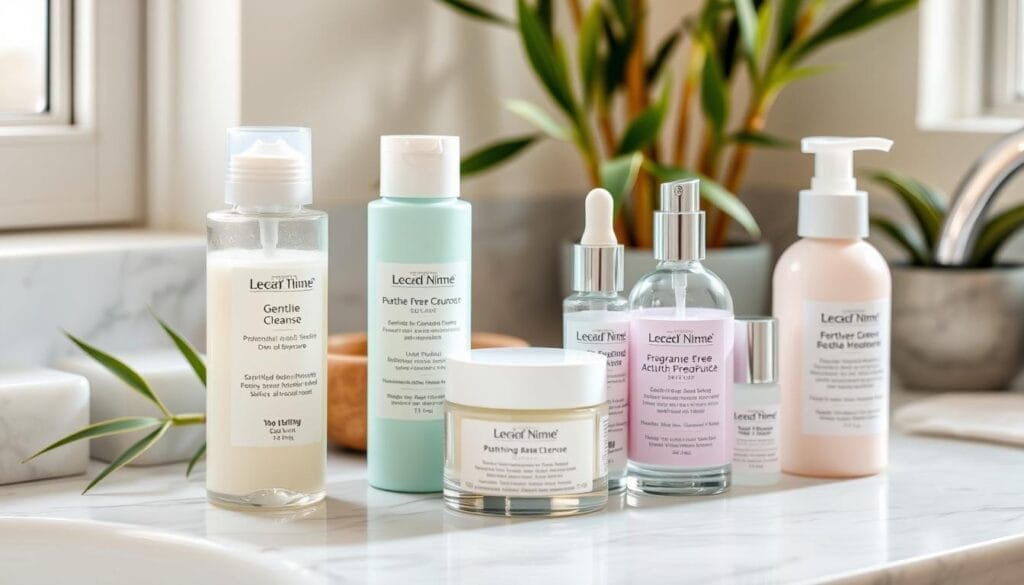
Harsh Chemicals and Irritants
Common irritants in skincare products include harsh chemicals. These are:
- Sulfates (SLS and SLES)
- Alcohol
- Retinoids
- Alpha-hydroxy acids (AHAs)
- Beta-hydroxy acids (BHAs)
While good for some, these can be too harsh for sensitive skin. Look for products made for sensitive skin and avoid these irritants.
Fragrances and Essential Oils
Fragrances and essential oils add scent to products. But they can irritate sensitive skin. Even natural ones can cause reactions.
For less risk of irritation, choose fragrance-free skincare products. Make sure the label says “fragrance-free” or “unscented,” not “natural fragrance.”
| Ingredient Category | Examples to Avoid | Gentler Alternatives |
|---|---|---|
| Surfactants | Sodium Lauryl Sulfate (SLS), Sodium Laureth Sulfate (SLES) | Cocamidopropyl Betaine, Decyl Glucoside |
| Exfoliants | Glycolic Acid, Salicylic Acid | Lactic Acid, Mandelic Acid |
| Fragrances | Synthetic Fragrances, Essential Oils | Fragrance-Free, Unscented |
Knowing which ingredients to avoid and picking fragrance-free skincare can help avoid irritation. This makes your sensitive skin care routine gentle and caring.
Patch Testing: A Must for Sensitive Skin
If you have sensitive skin, it’s key to test new products before using them. Patch testing is a simple way to see if a product is good for your skin.
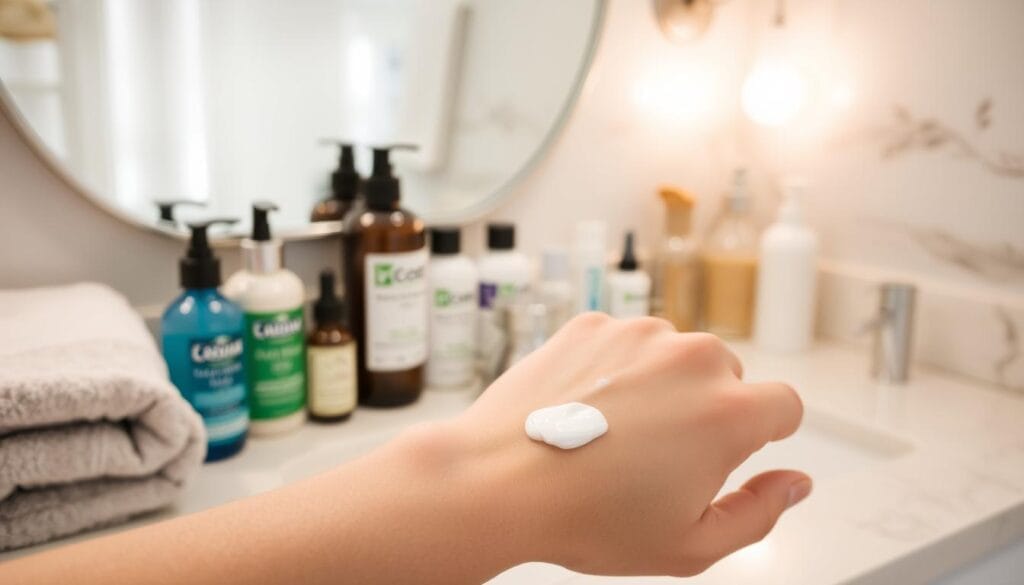
To patch test, put a small amount of the product on a hidden spot, like behind your ear or on your inner forearm. Watch for reactions for 24 to 48 hours. This helps you know if the product is safe for your face or body.
How to Perform a Patch Test
- Choose a small, hidden spot, like behind your ear or on your inner forearm.
- Put a small amount of the product on that spot.
- Use a bandage or leave it uncovered, as the product’s instructions suggest.
- Wait 24 to 48 hours and look for signs of irritation, redness, itching, or swelling.
Interpreting Patch Test Results
After waiting, check the test area for any reactions. Here’s a guide to help you understand what you see:
| Reaction | Interpretation |
|---|---|
| No visible changes or discomfort | The product is likely safe for your sensitive skin |
| Mild redness or itching that subsides quickly | Proceed with caution, using a small amount of the product initially |
| Persistent redness, itching, swelling, or burning sensation | Discontinue use, as the product may not be suitable for your sensitive skin |
Patch testing when testing new products can help you avoid irritating your sensitive skin. This way, you can create a skincare routine that’s gentle and effective for your skin.
Skincare for Sensitive Skin: Tips for Building a Routine
Building a skincare routine for sensitive skin needs a gentle and slow start. Too many products at once can cause irritation. Start with the basics and add new items slowly as your skin gets used to them.
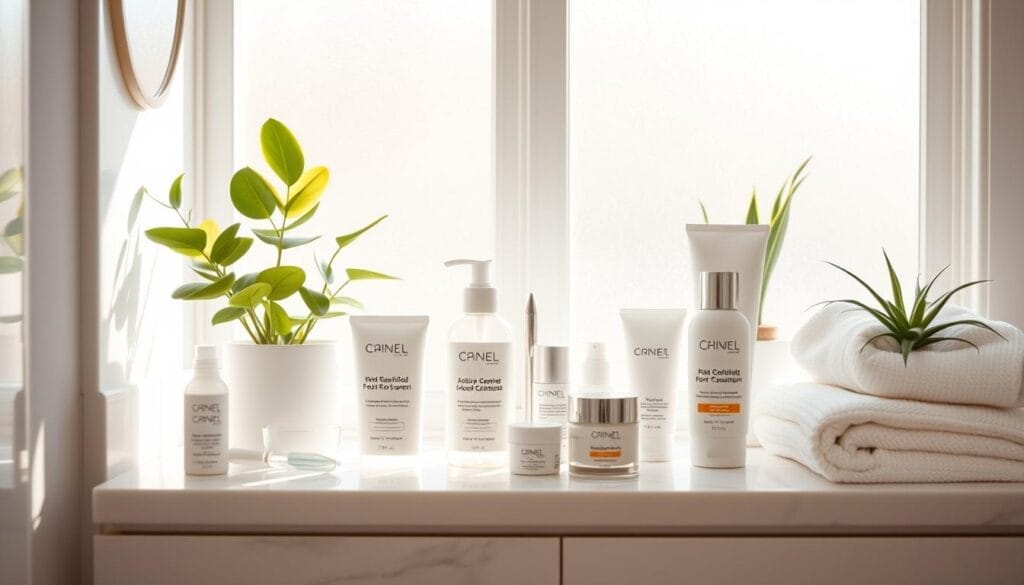
Starting with the Basics
Start with cleansing, moisturizing, and sun protection. Use a gentle, fragrance-free cleanser to remove dirt without drying your skin. Then, apply a light, non-irritating moisturizer to keep your skin hydrated and calm. Always finish with a broad-spectrum sunscreen with at least SPF 30 to protect your skin from UV rays.
Gradually Introducing New Products
After getting used to the basics, you can add new products like toners, serums, or exfoliants. But, add only one new product at a time. This lets your skin adjust without getting overwhelmed.
Choose products made for sensitive skin, with fewer ingredients and no harsh chemicals or fragrances. Always test new products on a small area of your skin before adding them to your routine. This ensures they won’t irritate your sensitive skin.
Dealing with Sensitive Skin Flare-Ups
If you have sensitive skin, you might know what it’s like to have flare-ups. These can make your skin feel irritated, red, and uncomfortable. Flare-ups can be caused by harsh skincare products, environmental stressors, or certain foods. Luckily, there are ways to calm your skin and manage these flare-ups.
First, find out what’s causing the flare-up. Check if you’ve started using new skincare products. If so, stop using them for a while. Also, watch out for environmental factors like extreme temperatures, wind, or pollution that might be making your skin more sensitive.
To soothe your skin, use gentle, fragrance-free products made for sensitive skin. Look for aloe vera, chamomile, and oatmeal, as they calm the skin. Apply a cool compress or a soothing mask to reduce redness and inflammation. This will give your sensitive skin the relief it needs.
Keep your skincare routine gentle during a flare-up. Don’t over-cleanse or exfoliate, as this can irritate your skin more. Use mild, non-foaming cleansers and lightweight, hydrating moisturizers. These help restore your skin’s natural barrier. Be patient, as it may take a few days for your skin to recover fully.
Skincare Tools and Devices for Sensitive Skin
Choosing the right skincare tools and devices is key for sensitive skin. Sensitive skin tools are made to be gentle and non-irritating. They help you get a healthy, glowing look without redness or discomfort. Gentle exfoliation tools and facial massagers are two must-haves for your routine.
Gentle Exfoliation Tools
Gentle exfoliation is important for removing dead skin and clearing pores. But, it can be hard for sensitive skin. Look for soft, non-abrasive tools like silicone facial brushes or konjac sponges.
These tools gently remove dead skin without irritation. Your skin will feel smooth and refreshed. When exfoliating, use light pressure and do it only once or twice a week. This prevents over-stimulating your skin.
Facial Massagers for Sensitive Skin
Facial massagers boost circulation, reduce puffiness, and enhance your glow. For sensitive skin, choose gentle massagers made from jade or rose quartz. These stones are cooling and soothing, calming irritated skin.
Apply a small amount of facial oil or serum for smooth gliding. Use light, upward strokes and avoid too much pressure to prevent irritation.
Adding these tools to your skincare routine can make your skin healthier and more radiant. Always be gentle with your skin and listen to its needs. This ensures the best care for your delicate, sensitive skin.
Seasonal Skincare Adjustments for Sensitive Skin
As the seasons change, so do the needs of your sensitive skin. Weather changes can bring new challenges, requiring you to adjust your seasonal skincare routine. By making a few simple changes, you can keep your sensitive skin looking and feeling its best all year.
In the colder months, dry air and harsh winds can dry out your skin. This can cause irritation and flakiness. To fight this, use a more emollient moisturizer that adds extra protection. Look for products with ceramides, hyaluronic acid, and glycerin to help lock in moisture and soothe sensitive skin.
When spring and summer come, your sensitive skin may get oily and sweaty. Choose lighter, water-based products that won’t clog pores or feel heavy. Also, apply a broad-spectrum sunscreen with at least SPF 30 to protect your skin from harmful UV rays.
It’s important to listen to your skin and adjust your seasonal skincare routine as needed. If you notice irritation or discomfort, reduce product use and give your skin time to heal. Remember, being consistent and gentle is key for caring for sensitive skin through changing weather.
Sensitive Skin and Makeup: Tips and Tricks
Makeup can be tough for sensitive skin, but the right products and techniques can help. You can get a flawless look without irritation. Here are some tips for choosing and applying sensitive skin makeup to keep your skin healthy and glowing.
Choosing the Right Makeup Products
When you’re shopping for makeup, look for hypoallergenic formulas made for sensitive skin. These products avoid common irritants like fragrances, dyes, and preservatives. Look for:
- Mineral-based powders and foundations
- Natural, plant-based oils and extracts
- Soothing ingredients like aloe vera and chamomile
Choose trusted brands known for gentle, non-irritating products. Good options include Bare Minerals, Almay, and Clinique.
Application Techniques for Sensitive Skin
Applying makeup right is key to avoiding irritation. Here are some gentle application tips:
- Always start with a clean, moisturized face for a smooth makeup base.
- Use your fingers or a soft brush for foundation and concealer. Pat gently. Don’t rub or pull.
- Don’t apply too many layers to avoid clogged pores and breakouts.
- Remove makeup well at night with a gentle cleanser and lukewarm water.
By following these tips and choosing the right products, you can enjoy beautiful makeup looks all without harming your sensitive skin.
Lifestyle Factors That Impact Sensitive Skin
Your sensitive skin lifestyle is key to caring for your delicate skin. It’s not just about your skincare routine. Daily life choices can greatly affect your skin’s health and look. Let’s look at two important lifestyle factors: diet and managing stress.
Diet and Hydration
A diet for sensitive skin should include foods that are good for your skin. Eat lots of fruits, veggies, whole grains, and lean proteins. These foods give your skin the vitamins and antioxidants it needs to stay healthy.
Drinking enough water is also vital for your skin. Try to drink at least 8 glasses a day. This keeps your skin cells hydrated and working well. But cut down on caffeine and alcohol as they can dry out your skin and make it more sensitive.
Stress Management
Stress can really affect your skin, making it more sensitive. When stressed, your body makes cortisol, a hormone that can make your skin worse. To help your skin, find ways to manage stress every day.
Try relaxing activities like:
- Meditation
- Deep breathing exercises
- Yoga
- Regular exercise
- Spending time in nature
Also, make sure you get enough sleep. Not sleeping well can make you stressed and hurt your skin’s healing. Try to sleep 7-9 hours a night to help your skin and mind.
By choosing wisely in your sensitive skin lifestyle, you can help your skin. Eating right, staying hydrated, and managing stress can make your skin healthier and more resilient.
Conclusion
Caring for sensitive skin means being gentle and customizing your approach. Knowing what your skin needs and what might upset it is key. Choose products with simple, non-irritating ingredients. Also, introduce new items slowly to avoid shocking your skin.
Using tips like patch testing and applying lightweight moisturizers can help. Protecting your skin from the sun is also vital. Remember, a balanced diet, staying hydrated, and managing stress are important too. They all help your sensitive skin stay healthy and look good.
By focusing on your skin’s needs and using a gentle routine, you can make your sensitive skin look and feel great. With the right products and a consistent effort, you can achieve a calm, radiant complexion. Listen to your skin and treat it with care.




